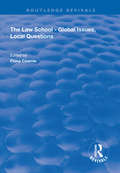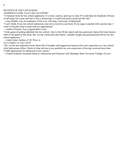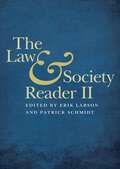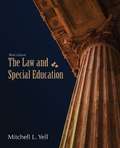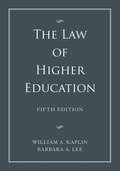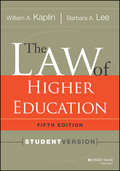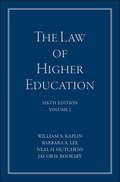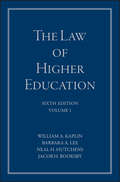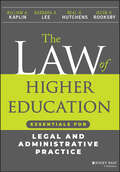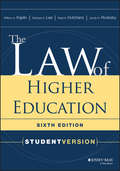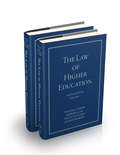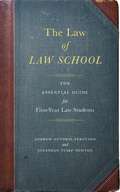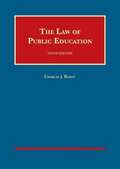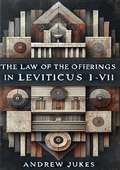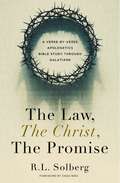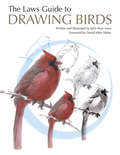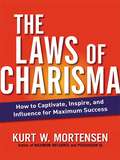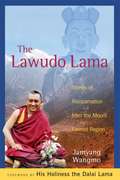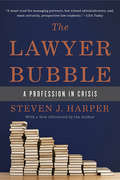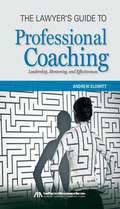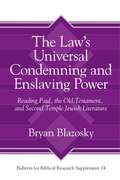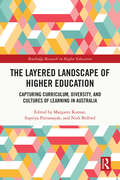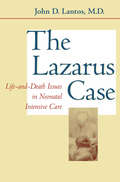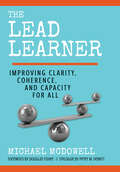- Table View
- List View
The Law School - Global Issues, Local Questions: Global Issues, Local Questions (Routledge Revivals)
by Fiona CownieFirst published in 1999, this international collection of essays on legal education addresses the following issues: The Law School and the University. Research into legal education has often been regarded as a marginal activity as compared with research into substantive areas of law. However, recent years have seen a growing interest in discussions about the purpose of the university law school and the ways in which law is taught within it. Are we educating professional lawyers or legal scholars? What do we really mean when we say we want to offer ‘a liberal education in the law’? What effect are the current changes in higher education funding and policy having on law schools and what takes place within them? The international group of scholars who have contributed to this collection come from very different jurisdictions, but they have written about topics which, while they have local resonances, are of concern globally. Global Issues, Local Questions addresses matters which concern all law teachers, whatever their field of substantive legal expertise.
The Law School Decision Game: A Playbook for Prospective Lawyers
by Ann K. LevineWhether you’re considering law school or are already committed, "The Law School Decision Game: A Playbook for Prospective Lawyers" explains your choice to enter the legal profession with the candor readers have come to expect from Ann Levine's Law School Expert blog including: <p><p>•What lawyers do, how much money they make, and how hard they work. <p>•What’s important in choosing a law school. <p>•What BigLaw is really like.•What to consider before taking on student loan debt in today's job market. <p>•What you can do now to increase your likelihood of getting hired later. <p>•What is important in choosing an area of specialization. <p>•What you need to know and do in law school and in the first few years of your career to set yourself up for success.
The Law and Society Reader II (Washington Mews)
by Erik Larson Patrick SchmidtLaw and society scholars challenge thecommon belief that law is simply a neutral tool by which society sets standardsand resolves disputes. Decades of research shows how much the nature ofcommunities, organizations, and the people inhabiting them affect how lawworks. Just as much, law shapes beliefs, behaviors, and wider socialstructures, but the connections are much more nuanced—and surprising—than manyexpect.Law and SocietyReader IIprovides readers an accessible overview to the breadth of recent developmentsin this research tradition, bringing to life the developments in this dynamicfield. Following up a first Law andSociety Reader published in 1995, editors Erik W. Larson and Patrick D.Schmidt have compiled excerpts of 43 illuminating articles published since 1993in The Law & Society Review, theflagship journal of the Law and Society Association.By its organizationand approach, this volume enables readers to join in discussing the key ideasof law and society research. The selections highlight the core insights anddevelopments in this research tradition, making these works indispensable forthose exploring the field and ideal for classroom use. Across sixconcisely-introduced sections, this volume analyzes inequality, lawyering, therelation between law and organizations, and the place of law in relation toother social institutions.
The Law and Special Education (Third Edition)
by Mitchell L. YellIn the highly litigated area of Special Education, it is imperative that professionals in the field understand the legal requirements of providing a free appropriate public education to students with disabilities. This indispensable textbook prepares the reader with the essential skills to locate pertinent information in law libraries, on the Internet, and other sources to keep abreast of the constant changes and developments in the field. Now in the third edition, the entire textbook has been thoroughly updated and revised with the latest information on the statutes, regulations, policy guidance, and cases on special education law, as well as the most current information on: the Individuals with Disabilities Education Act, Section 504 of the Rehabilitation Act and the Elementary and Secondary Education Act, The Family Educational Rights and Privacy Act (FERPA), and the Health Insurance Portability and Accountability Act (HIPAA). Long-recognized as one of the top special education law books in the field, The Law and Special Education, Third Edition, presents the most important and necessary information for educators to understand the history and development of special education laws and the requirements of these laws in the field of special education.
The Law of Higher Education, 2 Volume Set
by Barbara A. Lee William A. KaplinMake sure you have a copy on your bookshelf.The Law of Higher Education, Fifth Edition, is the most up-to-date and comprehensive reference, research source, and practical legal guide for college and university administrators, campus attorneys, legal counsel, and institutional researchers, addressing all the major legal issues and regulatory developments in higher education.In the increasingly litigious environment of higher education, William A. Kaplin and Barbara A. Lee's clear, cogent, and contextualized legal guide proves more and more indispensable every year.Over 3,000 new cases related to higher education have been decided since the publication of the previous edition, and scores of changes to higher education law are made each year. Every section of the fifth edition contains new material, including those related to:Hate speech and free speech rights of faculty in public universitiesSharing of research with international colleaguesIntellectual property and peer-to-peer file sharingStudent suicideCampus safetyPolice and administrators' right to search students' residence hall roomsGovernmental support for religious institutions and religious autonomy rights of individual public institutionsCollective bargaining and antidiscrimination lawsNondiscrimination and affirmative action in employment, admissions, and financial aidFamily and Medical Leave Act and workers' compensationFERPA (Family Educational Rights and Privacy Act)
The Law of Higher Education, 5th Edition
by Barbara A. Lee William A. KaplinBased on the fifth edition of the indispensable guide to the laws that bear on the conduct of higher education, this student edition provides an up-to-date textbook, reference, and guide for coursework in higher education law and programs preparing higher education administrators for leadership roles. This student edition contains a glossary of key terms and an appendix on how to read legal material for the non-law student. Each chapter is introduced by a discussion of key terms and ideas the students will encounter.
The Law of Higher Education, A Comprehensive Guide to Legal Implications of Administrative Decision Making: Student Version (The\jossey-bass Higher And Adult Education Ser.)
by Barbara A. Lee William A. Kaplin Jacob H. Rooksby Neal H. HutchensYour must-have resource on the law of higher education Written by recognized experts in the field, the latest edition of The Law of Higher Education, Vol. 2 offers college administrators, legal counsel, and researchers with the most up-to-date, comprehensive coverage of the legal implications of administrative decision making. In the increasingly litigious environment of higher education, William A. Kaplin and Barbara A. Lee’s clear, cogent, and contextualized legal guide proves more and more indispensable every year. Two new authors, Neal H. Hutchens and Jacob H Rooksby, have joined the Kaplin and Lee team to provide additional coverage of important developments in higher education law. From hate speech to student suicide, from intellectual property developments to issues involving FERPA, this comprehensive resource helps ensure you’re ready for anything that may come your way. Includes new material since publication of the previous edition Covers Title IX developments and intellectual property Explores new protections for gay and transgender students and employees Delves into free speech rights of faculty and students in public universities Expands the discussion of faculty academic freedom, student academic freedom, and institutional academic freedom Part of a 2 volume set If this book isn’t on your shelf, it needs to be.
The Law of Higher Education, A Comprehensive Guide to Legal Implications of Administrative Decision Making: Student Version (The\jossey-bass Higher And Adult Education Ser.)
by Barbara A. Lee William A. Kaplin Jacob H. Rooksby Neal H. HutchensYour must-have resource on the law of higher education Written by recognized experts in the field, the latest edition of The Law of Higher Education, Vol. 1 offers college administrators, legal counsel, and researchers with the most up-to-date, comprehensive coverage of the legal implications of administrative decision making. In the increasingly litigious environment of higher education, William A. Kaplin and Barbara A. Lee’s clear, cogent, and contextualized legal guide proves more and more indispensable every year. Two new authors, Neal H. Hutchens and Jacob H Rooksby, have joined the Kaplin and Lee team to provide additional coverage of important developments in higher education law. From hate speech to student suicide, from intellectual property developments to issues involving FERPA, this comprehensive resource helps ensure you’re ready for anything that may come your way. Includes new material since publication of the previous edition Covers Title IX developments and intellectual property Explores new protections for gay and transgender students and employees Delves into free speech rights of faculty and students in public universities Expands the discussion of faculty academic freedom, student academic freedom, and institutional academic freedom Part of a 2 volume set If this book isn’t on your shelf, it needs to be.
The Law of Higher Education: Essentials for Legal and Administrative Practice
by Barbara A. Lee William A. Kaplin Jacob H. Rooksby Neal H. HutchensA comprehensive, up-to-date reference for higher education law faculty, administrators, counsel, and students This revised 7th Edition of The Law of Higher Education: Essentials for Legal and Administrative Practice offers updated information, analysis, and practical suggestions on a full range of legal issues pertinent to both public and private institutions. As a guide for coursework in programs preparing higher education lawyers and administrators for leadership roles, and as a reference for professionals in those fields, this book is essential for both students and practitioners. Covering the latest changes to laws in higher education, the 7th edition gives readers the most current possible understanding of higher education law. The book also contains a glossary of key terms and an appendix on how to read legal material for the non-law student. Each chapter is introduced by a discussion of key terms and ideas the reader will encounter. The book thoroughly addresses the most important contemporary issues in education law: free speech, Title IX, academic freedom, institutional tort liability, racial harassment, employment discrimination, disability and reasonable accommodation, campus security, and student organizations are among the key topics that readers will come to understand in depth. There have been substantial recent changes in the laws governing these issues, and practitioners will need the updated content in this book to remain conversant in todays' higher education law and policy. Gain a thorough understanding of the central topics in higher education law, including free speech, nondiscrimination, religious free exercise, and many others Review the latest changes to federal laws governing colleges and universities Reference a glossary of terms, statute index, and other convenient features Learn about the American court system and how to read and analyze court opinions The Law of Higher Education: Essentials for Legal and Administrative Practice is indispensable for anyone studying higher education administration, preparing for a career in higher education law, or seeking to learn more about law in higher education.
The Law of Higher Education: Student Version (The\jossey-bass Higher And Adult Education Ser.)
by Barbara A. Lee William A. Kaplin Jacob H. Rooksby Neal H. HutchensA single-volume text that distills information for students Based on the sixth edition of Kaplin and Lee’s indispensable guide to the law that bears on the conduct of higher education, The Law of Higher Education, Sixth Edition: Student Version provides an up-to-date reference and guide for coursework in higher education law and programs preparing law students and higher education administrators for leadership roles. This student edition discusses the most significant areas of the law for college and university attorneys and administrators. Each chapter is introduced by a discussion of key terms and topics the students will encounter, and the book includes materials from the full sixth edition that are most relevant to student interests and classroom instruction. It also contains a “crosswalk” that keys sections of the Student Edition to counterpart sections of the two-volume treatise. Complements the full version Includes a glossary of legal terms and an appendix on how to read legal material for students without legal training Discusses key terms in each chapter Concentrates on key topics students will need to know This is fundamental reading for law students preparing for careers in higher education law and for graduate students in higher education administration programs.
The Law of Higher Education: Student Version (The\jossey-bass Higher And Adult Education Ser.)
by Barbara A. Lee William A. Kaplin Jacob H. Rooksby Neal H. HutchensYour must-have resource on the law of higher education Written by recognized experts in the field, the latest edition of The Law of Higher Education offers college administrators, legal counsel, and researchers with the most up-to-date, comprehensive coverage of the legal implications of administrative decision making. In the increasingly litigious environment of higher education, William A. Kaplin and Barbara A. Lee's clear, cogent, and contextualized legal guide proves more and more indispensable every year. Two new authors, Neal H. Hutchens and Jacob H Rooksby, have joined the Kaplin and Lee team to provide additional coverage of important developments in higher education law. From hate speech to student suicide, from intellectual property developments to issues involving FERPA, this comprehensive resource helps ensure you're ready for anything that may come your way. Includes new material since publication of the previous edition Covers Title IX developments and intellectual property Explores new protections for gay and transgender students and employees Delves into free speech rights of faculty and students in public universities Expands the discussion of faculty academic freedom, student academic freedom, and institutional academic freedom If this book isn't on your shelf, it needs to be.
The Law of Law School: The Essential Guide for First-Year Law Students
by Andrew Guthrie Ferguson Jonathan Yusef NewtonOffers one hundred rules that every first year law student should live by“Dear Law Student: Here’s the truth. You belong here.” Law professor Andrew Ferguson and former student Jonathan Yusef Newton open with this statement of reassurance in The Law of Law School. As all former law students and current lawyers can attest, law school is disorienting, overwhelming, and difficult. Unlike other educational institutions, law school is not set up simply to teach a subject. Instead, the first year of law school is set up to teach a skill set and way of thinking, which you then apply to do the work of lawyering. What most first-year students don’t realize is that law school has a code, an unwritten rulebook of decisions and traditions that must be understood in order to succeed.The Law of Law School endeavors to distill this common wisdom into one hundred easily digestible rules. From self-care tips such as “Remove the Drama,” to studying tricks like “Prepare for Class like an Appellate Argument,” topics on exams, classroom expectations, outlining, case briefing, professors, and mental health are all broken down into the rules that form the hidden law of law school. If you don’t have a network of lawyers in your family and are unsure of what to expect, Ferguson and Newton offer a forthright guide to navigating the expectations, challenges, and secrets to first-year success. Jonathan Newton was himself such a non-traditional student and now shares his story as a pathway to a meaningful and positive law school experience. This book is perfect for the soon-to-be law school student or the current 1L and speaks to the growing number of first-generation law students in America.
The Law of Public Education
by Charles J. RussoThe Tenth Edition of this textbook-casebook incorporates recent developments in K-12 Education Law into its conceptual framework by offering updated analysis of major topics in the field. The Tenth Edition added more than 500 case citations since 2014 along with substantive discussions of many of these suits. In addition, the book includes five new case excerpts of opinions on cutting edge issues addressing state aid to faith-based educational institutions in Chapter 2; whether communications by school board members via e-mail messages violate a state’s open meetings law in Chapter 4; the extent to which school boards may promote ballot initiatives in Chapter 4; transfer rules impacting student-athletes in interscholastic sports in Chapter 12; and the level of services school boards must provide students with disabilities in Chapter 15. Citations continue to include references to West’s Education Law Reporter, thereby making it easier for instructors, students, practitioners, and other readers to locate cases and materials.
The Law of the Offerings in Leviticus I-VII: Considered As The Appointed Figure Of The Various Aspects Of The Offering Of The Body Of Jesus Christ
by Andrew JukesThe Law of the Offerings in Leviticus I-VII by Andrew Jukes is a profound and insightful exploration of the sacrificial system outlined in the Book of Leviticus. This scholarly work delves into the intricate details and spiritual significance of the offerings prescribed in the first seven chapters of Leviticus, providing readers with a deeper understanding of their theological and symbolic meanings.Andrew Jukes, a respected theologian and biblical scholar, meticulously examines each type of offering, including the burnt offering, grain offering, peace offering, sin offering, and guilt offering. Through careful analysis and interpretation, Jukes uncovers the rich spiritual truths embedded in these ancient rituals, demonstrating how they foreshadow and illuminate key aspects of Christian faith and doctrine.The Law of the Offerings in Leviticus I-VII is more than just a commentary; it is a spiritual journey that invites readers to reflect on the profound connections between the Old Testament sacrificial system and the redemptive work of Jesus Christ. Jukes highlights the continuity between the Old and New Testaments, revealing how the offerings serve as types and shadows of the ultimate sacrifice made by Christ on the cross.Jukes' eloquent writing and deep theological insights make this book an invaluable resource for pastors, theologians, and laypersons seeking to enhance their understanding of biblical sacrifices and their relevance to Christian theology. His thorough exegesis and thoughtful reflections provide readers with a comprehensive and enriching study of the offerings, encouraging them to appreciate the depth and beauty of God's redemptive plan.The Law of the Offerings in Leviticus I-VII is an essential read for anyone interested in biblical studies, theology, or the spiritual significance of the Levitical sacrifices. Andrew Jukes' masterful exposition offers a timeless and enlightening perspective on the offerings, drawing readers closer to the heart of biblical worship and the profound truths of the Christian faith.
The Law, the Christ, the Promise: A Verse-By-Verse Apologetics Bible Study through Galatians
by R. L. SolbergIn the face of modern challenges to faith, The Law, the Christ, the Promise by Professor R.L. Solberg is an essential guide for believers seeking a firmer grasp on Christian truths. This concise yet profound verse-by-verse Bible study dissects the Apostle Paul's message to the Galatians, addressing false teachings and bringing to light the significance of justification, righteousness, and God's promise through Christ. Solberg's engaging exploration offers historical insights, theological depth, and practical applications, enriching readers' understanding of the gospel's freedom. Ideal for those eager to reinforce their faith against contemporary skepticism, The Law, the Christ, the Promise serves as both an enlightening study and a shield against the distortion of the true gospel. It's a pivotal read for anyone looking to deepen their grasp on the gospel and defending it today.
The Laws Guide to Drawing Birds
by John Muir LawsJohn Muir Laws’s guide to drawing birds is itself winged, soaring between a devotion not only to art but also to the lives, forms, and postures of the birds themselves. Here, artistic technique and the exquisite details of natural history intertwine, and drawing becomes the vehicle for seeing. As Laws writes, “To draw feathers, you must understand how feathers grow, overlap, and insert into the body. To create the body, you must have an understanding of the bird’s skeletal structure. To pose this skeleton, you must be able to perceive the energy, intention, and life of the bird.” This how-to guide will perfect the technique of serious arists but also, perhaps more importantly, it will provide guidance for those who insist they can’t draw. Leading the mind and hand through a series of detailed exercises, Laws delivers what he promises: that “drawing birds opens you to the beauty of the world.” An Audubon Book.
The Laws of Charisma: How to Captivate, Inspire, and Influence for Maximum Success
by Kurt W. MortensenSome people have the ability to enter a room and draw instant attention, effortlessly exuding charm, radiating energy and a commanding presence. That enviable quality is called charisma! And those who have it are better able to influence what gets done and ultimately achieve what they want. To some extent, it's innate - but with a few simple principles anyone can develop a more charismatic and compelling presence. Filled with practical, powerful tools, exercises, and assessments, "The Laws of Charisma" explores the vital skills and traits anyone can use to earn trust, generate interest, and motivate others. Focusing on the four core elements of charisma, this book shows readers how to: radiate confidence, passion, power, and optimism; combine purpose, creativity, competence, and focus to inspire commitment; influence others by improving communication skills; and persuade and empower anyone by creating instant rapport. Charisma is the key that will unlock the door to improved relationships, greater income, and enhanced success in every area of life. "The Laws of Charisma" is all anyone needs to bring out the charismatic person within.
The Lawudo Lama
by His Holiness the Dalai Lama Jamyang WangmoThe Lawudo Lama presents two life stories along with an extended introduction laying out their social and cultural context. It takes place in the Mount Everest region of Nepal, the home of the famous Sherpa guides, where the people practice Tibetan Buddhism and revere the local lamas and yogis. The stories are centered in Lawudo, a small village in the Khumbu region, and the central figure is the renowned Lawudo Lama. The first Lawudo Lama portrayed, Lama Kunzang Yeshe (1864-1946), was a yogi of the Nyingma lineage who spent much of his life meditating in a cave near Lawudo, and his life is reconstructed through meticulous research of written and oral histories. The second story is of Kunzang Yeshe's reincarnation, a monk of the Gelug lineage known as Lama Zopa Rinpoche, whose story is given in a first-person narrative. Lama Zopa is well known in the West as the author of several books and as the Spritual Director of the Foundation for the Preservation of the Mahayana Tradition (FPMT), which has more than 100 affiliate Buddhist centers worldwide. Lama Zopa Rinpoche travels and teaches extensively to large audiences and has thousands of students. The Lawudo Lama will appeal to travelers to Nepal, to Buddhist practitioners, and to scholars trying to understand the culture of the region. It is well documented, and is accompanied by more than 125 color and black and white photos, drawings, lineage charts, and maps.
The Lawyer Bubble: A Profession In Crisis
by Steven J. HarperA noble profession is facing its defining moment. From law schools to the prestigious firms that represent the pinnacle of a legal career, a crisis is unfolding. News headlines tell part of the story--the growing oversupply of new lawyers, widespread career dissatisfaction, and spectacular implosions of pre-eminent law firms. Yet eager hordes of bright young people continue to step over each other as they seek jobs with high rates of depression, life-consuming hours, and little assurance of financial stability. The Great Recession has only worsened these trends, but correction is possible and, now, imperative. In The Lawyer Bubble, Steven J. Harper reveals how a culture of short-term thinking has blinded some of the nation’s finest minds to the long-run implications of their actions. Law school deans have ceded independent judgment to flawed U. S. News & World Report rankings criteria in the quest to maximize immediate results. Senior partners in the nation’s large law firms have focused on current profits to enhance American Lawyer rankings and individual wealth at great cost to their institutions. Yet, wiser decisions--being honest about the legal job market, revisiting the financial incentives currently driving bad behavior, eliminating the billable hour model, and more--can take the profession to a better place. A devastating indictment of the greed, shortsightedness, and dishonesty that now permeate the legal profession, this insider account is essential reading for anyone who wants to know how things went so wrong and how the profession can right itself once again.
The Lawyer's Guide to Professional Coaching: Leadership, Mentoring, and Effectiveness
by Andrew ElowittBecome more efficient and profitable in your law practice by employing a professional coach. The Lawyer's Guide to Professional Coaching will teach you to find, select, and work productively with the right coach for your needs--and transform your practice in the process. Learn how to get the most out of coaching, decide whether coaching is right for you and your firm, and use coaching skills when you collaborate with clients and colleagues.
The Law’s Universal Condemning and Enslaving Power: Reading Paul, the Old Testament, and Second Temple Jewish Literature (Bulletin for Biblical Research Supplement #24)
by Bryan BlazoskyWhile much has been written about the apostle Paul’s view on the relationship between Gentile Christians and the Mosaic law, comparatively little attention has been paid to Paul’s writings on the laws of Moses and how they apply to Gentile unbelievers. In this book, Bryan Blazosky examines Paul’s teaching on the subject and how it relates to the lessons of the Old Testament and literature of the Second Temple period.Blazosky explicates Paul’s views on Gentiles and law as they are articulated in the New Testament texts Galatians, Romans, Corinthians, Ephesians, Colossians, and Timothy, and he compares the Pauline perspective to those expressed in other Jewish writings, such as the Old Testament, the third Sibylline Oracle, Liber antiquitatum biblicarum, and 4 Ezra. Through a comparison of these texts, Blazosky finds that Paul—in line with the Old Testament and other Jewish texts—interprets the Mosaic law as having the power to universally condemn. Despite being gifted to Israel, the law’s ability to curse, condemn, and enslave reaches beyond its covenantal boundaries.As the first book-length study on the relationship between Gentile unbelievers and the Mosaic law in Pauline literature, The Law’s Universal Condemning and Enslaving Power will be welcomed by all who study the New Perspective on Paul, Gentile accountability, and the New Testament.
The Layered Landscape of Higher Education: Capturing Curriculum, Diversity, and Cultures of Learning in Australia (Routledge Research in Higher Education)
by Margaret Kumar Supriya Pattanayak Nish BelfordThis edited collection interrogates notions of curriculum, inclusivity, diversity, and cultures of learning in higher education from a variety of cultural backgrounds and educational perspectives.Bringing together an international selection of contributors from a range of disciplines, this book presents different avenues for rethinking the foundational base of cultures of learning while emphasising the importance of interculturality. The crux of the book lies in the fact that the contributors, living through complex cultures, speak/write from their own experiences of seeing, knowing, and doing. Through insights presented by the authors, the book promotes a broadened and deeper understanding of teaching and learning across diverse fields, including alternative knowledge, creative arts, education, technology, STEM, study skills, and environmental sustainability. Arguing for the need to review curriculum issues and policies at both an institutional and national level, it highlights the importance of creating collaborative spaces for constructing new and alternative scholarship and methods within higher education. Supported by case studies and examples of teaching practice, the text reveals the current state of educational and cultural changes and challenges for students and educators in higher education while looking towards the future.This book is a requisite text for academics, researchers, policymakers, support staff, and postgraduate students in higher education.
The Lazarus Case: Life-and-Death Issues in Neonatal Intensive Care (Medicine and Culture)
by John D. LantosA gripping exploration of the legal and ethical dilemmas in neonatal intensive care—a truly original work.Chosen as an Outstanding Academic Titles in 2003 by Choice MagazineIn this new, startlingly original book, John D. Lantos weaves a compelling story that captures the dilemmas of modern medical practice. The Lazarus Case: Life-and-Death Issues in Neonatal Intensive Care begins with a fictional malpractice case—an amalgam of typical cases in which Lantos appeared as an expert witness—and uses it as the framework for addressing the ethical issues surrounding neonatal intensive care. Lantos draws on his experience in neonatal medicine, pediatrics, and medical ethics to explore multiple ethical dilemmas through one poignant representative situation.In Lantos's model case, a doctor decides to stop resuscitation of a premature infant, a tiny "preemie" who seems past reasonable care. The baby survives with severe neurological defects and the parents sue the doctor, alleging that stopping treatment was negligent. From this case, Lantos considers our moral obligations to critically ill babies, the meaning of negligence, and the sorts of social structures that shape the moral consciences of doctors.Each chapter begins with Lantos deposing in the conference room of the plaintiffs' lawyers. The questions put to Lantos throughout the deposition spark an engrossing retelling of his personal experiences with premature babies, as well as his thoughtful discussions of ethics, morality, history, and medical statistics. Sprinkled throughout the book are references to fictional works by Camus, Dostoevsky, Shakespeare, Twain, and others. Lantos uses these literary examples to further illustrate the ambiguities, misunderstandings, responsibilities, and evasions that plague our decisions regarding life and death, medical care and medical education, and ultimately the cost and value of preserving the lives of the most vulnerable among us.
The Lead Learner: Improving Clarity, Coherence, and Capacity for All
by Michael McDowellTo make a lasting impact, start with your own learning. What’s better: a rigorous system that emphasizes traditional academics, or an innovative one that prepares students for tomorrow’s world? With McDowell’s new model of educational leadership, you don’t have to choose. You can create an impactful system that ensures growth for all students in both core academic content and 21st-century skills. The Lead Learner shows you how starting with your own professional learning helps you plan for and meet the unique learning needs of staff and students—while getting the biggest impact from your limited time. You’ll also find ways to: Ensure clarity in strategic planning Establish coherence throughout the system Enact system-wide capacity-building processes Craft your personal leadership skills With practical examples, stories from the field, and numerous activities and reflective questions, this insightful book takes you step-by-step through the work of the learning leader—so you can ensure engaged learning for all. The enduring contribution of this book is in the guidance it provides leaders to recognize that they are part, an important part, but just a part, of a networked system. As such, their decisions and actions send messages throughout the system about what is valued and what is not. Take heed to McDowell’s advice and you’ll have a healthy, growth-producing system that will be the envy of those around you. The work is possible, the information is available, and the results are clear. Douglas Fisher San Diego State University
The Lead Learner: Improving Clarity, Coherence, and Capacity for All
by Michael McDowellTo make a lasting impact, start with your own learning. What’s better: a rigorous system that emphasizes traditional academics, or an innovative one that prepares students for tomorrow’s world? With McDowell’s new model of educational leadership, you don’t have to choose. You can create an impactful system that ensures growth for all students in both core academic content and 21st-century skills. The Lead Learner shows you how starting with your own professional learning helps you plan for and meet the unique learning needs of staff and students—while getting the biggest impact from your limited time. You’ll also find ways to: Ensure clarity in strategic planning Establish coherence throughout the system Enact system-wide capacity-building processes Craft your personal leadership skills With practical examples, stories from the field, and numerous activities and reflective questions, this insightful book takes you step-by-step through the work of the learning leader—so you can ensure engaged learning for all. The enduring contribution of this book is in the guidance it provides leaders to recognize that they are part, an important part, but just a part, of a networked system. As such, their decisions and actions send messages throughout the system about what is valued and what is not. Take heed to McDowell’s advice and you’ll have a healthy, growth-producing system that will be the envy of those around you. The work is possible, the information is available, and the results are clear. Douglas Fisher San Diego State University
